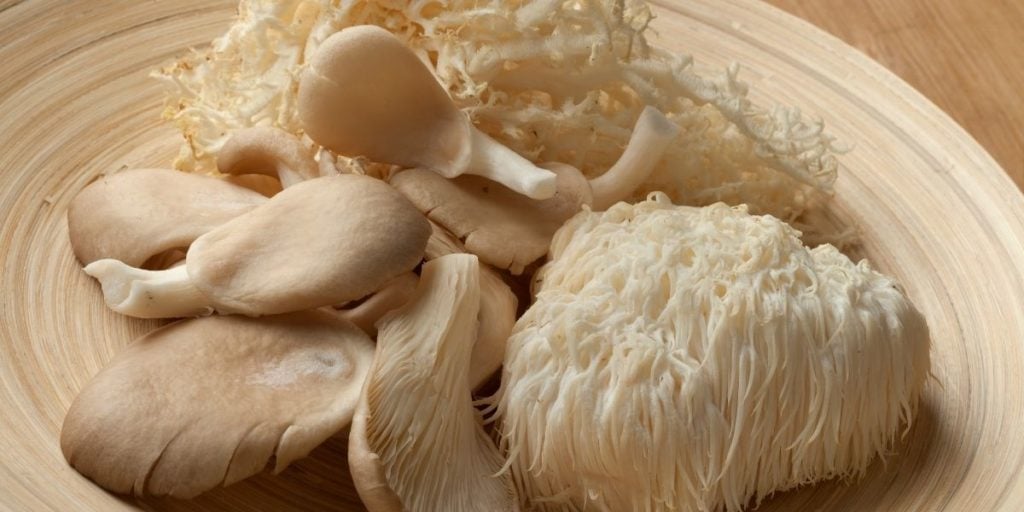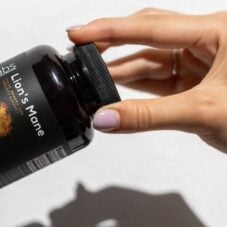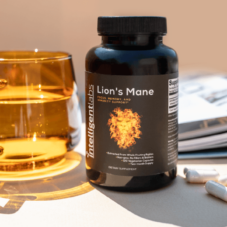Nootropics
Lion’s Mane Mushrooms: The Ultimate Guide To Nature’s Brain Booster
The next time you go for a walk in the woods, keep an eye out for lion’s mane mushrooms, a natural nootropic that can help your brain fire on all cylinders! These shrooms have a distinct appearance, so they should be easy to spot. They look similar to a bushy lion’s mane, a piece of coral, or cheerleading pom-poms. Look closely at the side of dead logs, typically hardwood, and you might see a cluster peeking out.
So, what’s the big deal with lion’s mane mushrooms? What do you get from taking it? How much should you take to achieve health benefits, if any? Scroll down as we answer all your questions about these tasty shrooms!
TL;DR: This post covers everything you need to know about lion’s mane mushrooms. E.g. what it is, why it’s a popular nootropic, other potential health benefits, how to use it (in raw form vs supplement form), any possible side effects, and more!
Table of Contents
What are lion’s mane mushrooms?
Lion’s mane goes by quite a few names, but the scientific name for its most common variety is Hericium erinaceus. Other similar-looking but lesser-known species are Hericium americanum and Hericium coralloides. They all belong to the tooth fungus group and are found throughout the northern hemisphere in Asia, Europe, and North America. Other popular nicknames include:
- Monkey head mushroom (houtougo) in China
- Mountain priest mushroom (yamabushitake) in Japan
- Hedgehog mushroom, pom pom mushroom, and bearded mushroom in North America and Europe
Fortunately, lion’s mane mushrooms have NO poisonous look-alikes, so if you see it in the wild, you know it’s perfectly safe to eat (not raw though). In addition to its unique look, its taste and texture are similar to crab and lobster, so it’s perfect for adding to seafood-based recipes!
Lion’s mane as a powerful nootropic – what does the science say?
Lion’s mane is said to have cognitive-enhancing properties, and it’s touted as a natural nootropic, a smart drug, a brain shroom, and an intelligence booster. But is there merit behind these claims?
First, let’s define the term “nootropics”:
According to the Romanian psychologist who coined the term, nootropics are compounds or substances that “bend the mind”. Nootropics are safe and non-toxic, help enhance memory and learning, and improve cognitive function with little to no side effects (1).
So, is lion’s mane an effective nootropic?
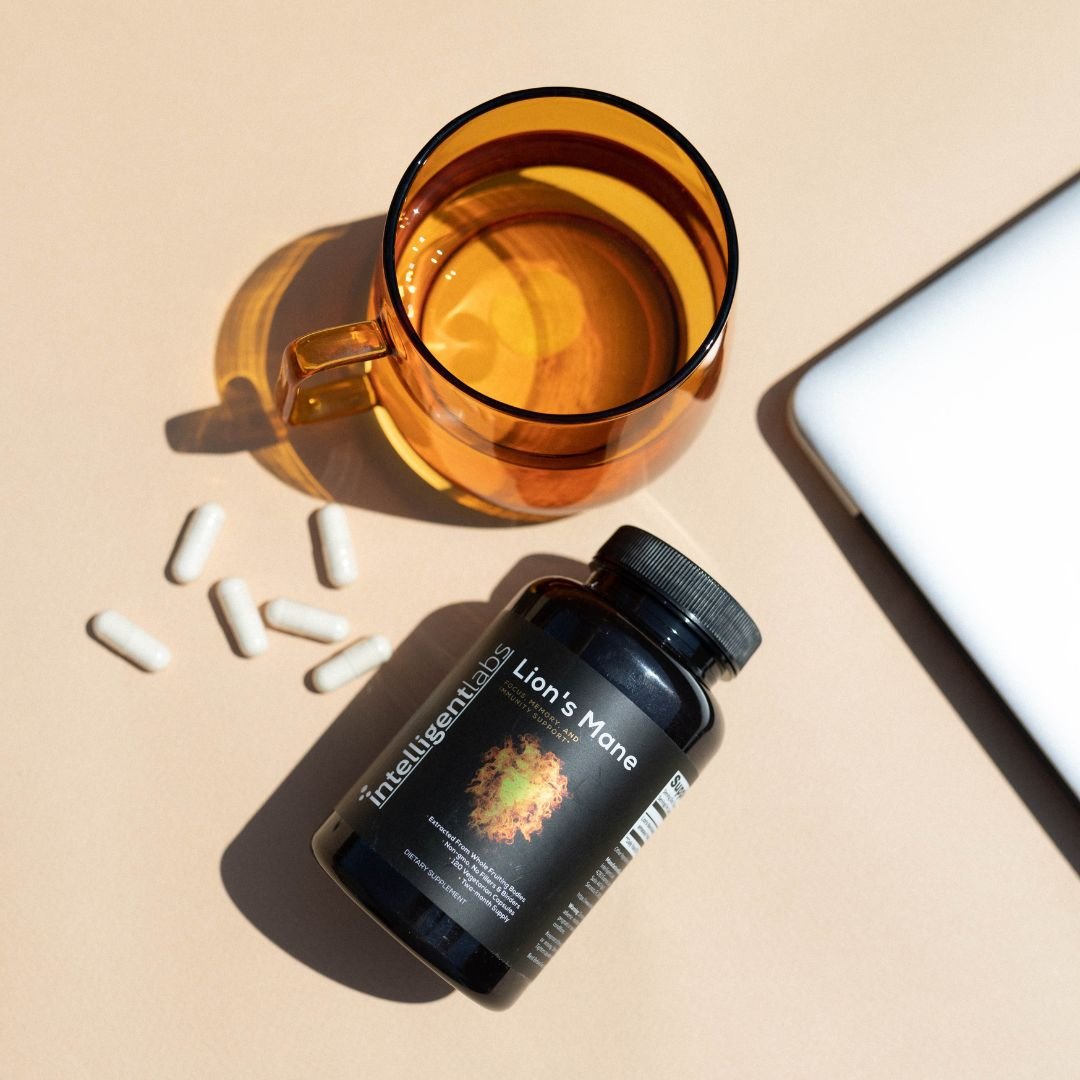
Well, here’s what a couple of scientific studies say:
A group of older Japanese men and women with mild cognitive impairment were given either lion’s mane or placebo. The lion’s mane group took four 250mg tablets 3x a day for 16 weeks (that’s a daily total of 3,000mg). Cognitive scores were measured at weeks 8, 12, and 16 weeks.
The result? The lion’s mane group scored consistently higher than the placebo group. However, 4 weeks after they stopped taking the mushroom, the scores decreased significantly. No adverse effects were reported. This study shows that you’ll need to take lion’s mane mushroom continuously if you want to keep experiencing its cognitive effects (2).
Another study randomly divided 30 menopausal women into two groups. They were given cookies containing either 500mg of lion’s mane powder or placebo. They then ate 4 cookies daily for 4 weeks (daily dosage adds up to 2,000mg). And the result? The women eating the mushroom cookies experienced lower anxiety, depression, frustration, and palpitation than the placebo group (3), meaning lion’s mane is indeed effective!
Does lion’s mane make you smarter?
Well, this question’s been asked for ages. Rumor has it that Buddhist monks have been drinking lion’s mane tea for centuries for this very reason. It’s said to enhance brain power and focus during long periods of meditation.
The two studies we’ve referenced in the previous section certainly support this theory (2, 3). As a nootropic, lion’s mane can indeed promote better memory and learning. It can help improve your focus and concentration, so you can retain information faster.
Give this natural smart drug a try – it just may help you ace whatever your goals are in both career and life!
Lion’s mane mycelium vs fruiting body – which is better for supplements?
Mushrooms can be divided into two parts: the visible part and the buried part. The visible part is known as the fruiting body, a.k.a. the “mushroom” as we all know it. The buried part is known as the mycelium. Think of it as the roots that provide nutrition to the actual mushroom above ground.
Here’s a graphic to help illustrate the point:
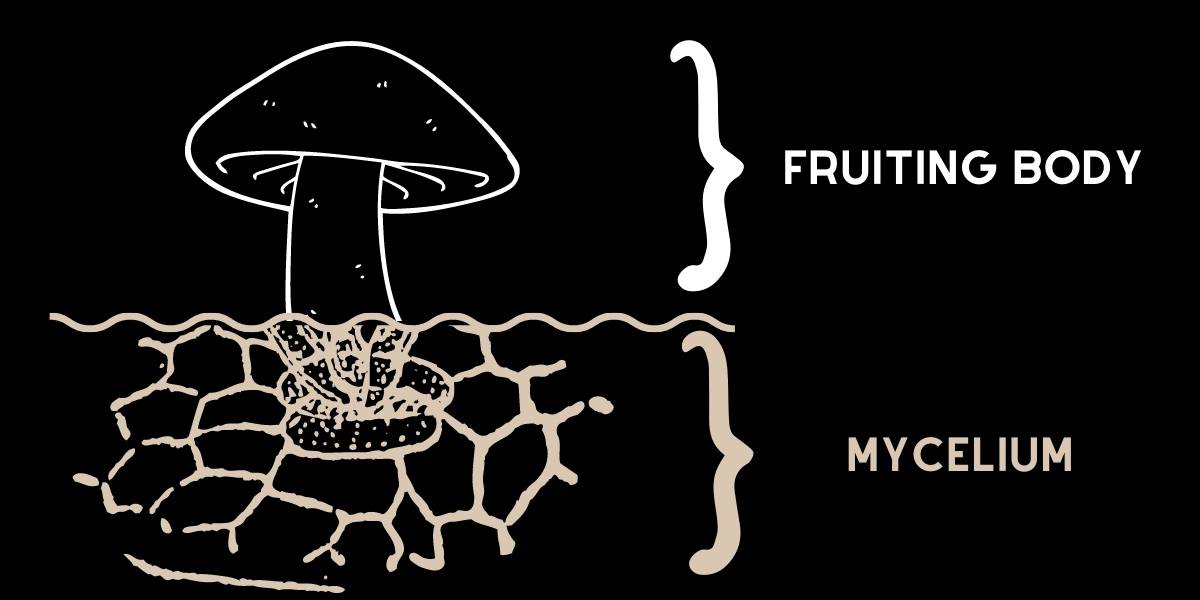
The fruiting body contains Hericenones, whilst the mycelium contains Erinacines. Both compounds promote nerve growth factor synthesis, meaning eating or supplementing with lion’s mane mushrooms can help stimulate the growth and repair of neurons. This, in turn, promotes better memory and learning (4).
The problem with lion’s mane capsules from mycelium
However, there are a few concerns when it comes to lion’s mane supplements made from mycelium. Most commercially cultivated lion’s mane mushrooms are cultured on a grain substrate, which means when the mycelium is harvested it typically contains more starch than the actual mycelium (5).
Additionally, the mycelium itself contains little to no beta-glucans, a naturally occurring polysaccharide with immunity-boosting properties (6). Beta-glucans may also help lower cholesterol levels as well as the risk of heart disease (7).
Why lion’s mane supplements from fruiting bodies are the better choice?
Lion’s mane mushroom products made from fruiting bodies are the ideal choice. You’re getting the actual mushroom, not the “roots”, along with all the bioactive compounds and health benefits it entails.
This is why for our Intelligent Labs Lion’s Mane supplement, we only use extracts taken from fruiting bodies. Each serving of our Lion’s Mane product contains 1000mg of fruiting body extract, with the beta-glucan content standardized to at least 25%.
Related article: Lion’s Mane Mycelium vs Fruiting Body – Key Facts You Need To Know
How to use lion’s mane mushrooms?
In addition to taking lion’s mane mushroom as a supplement (usually in powder form), there are a variety of ways to enjoy this gourmet mushroom.
But before we proceed, you’re probably wondering if there’s any point in eating these mushrooms at all? Well, certainly… just like many other edible mushrooms, lion’s mane is extremely low in fat and calories. It’s perfect for anyone watching their weight (8)!
Here’s a summary of nutritional facts for each 70g serving of lion’s mane (9):
| Calories: 15.4 | Calcium: 2.1mg |
| Protein: 2.16g | Iron: 0.35mg |
| Fat: 0.24g | Potassium: 223mg |
| Carbs: 2.28g | Magnesium: 6.3mg |
| Fiber: 0.7g | Phosphorus: 60.2mg |
Here are a few ways to enjoy these mushrooms:
- Fresh – you can add fresh mushrooms to soups. Or you can sauté, fry, bake, grill, or roast it. It’s quite versatile, so you can literally add it to any dish (check out these lion’s mane recipes for ideas). Also, for vegans, it’s the perfect meat and seafood substitute!
- Dried – dried mushrooms can also be used pretty much the same way as fresh ones, but with an extra step, that is, you’ll need to reconstitute them by soaking in water. Check the package instructions if rinsing is necessary prior to use.
- Powder – this is the form most lion’s mane supplements are made of. You can add it to coffee, tea, smoothies, your favorite cookie recipe or sprinkle it in your breakfast oats.
In addition to being an effective nootropic, does lion’s mane mushroom offer any other health benefits?
Here are some other potential benefits of taking this delicious mushroom, either as part of your diet or as a supplement.
1) It may help improve depression, anxiety, and sleep
There are antidepressants available, such as selective serotonin reuptake inhibitors (SSRI), serotonin and norepinephrine reuptake inhibitors (SNRI), and monoamine oxidase inhibitors. But these drugs require a prescription due to potential side effects and drug interactions (10). Fortunately, there are natural alternatives, one of which is lion’s mane mushrooms!
In an 8-week study that assessed the relationship between mood and sleep disorders in overweight and obese patients, the researchers found that giving the volunteers Hericium erinaceus capsules resulted in an improvement in depression, anxiety, and sleep quality. The capsules were formulated with 80% mycelia extract and 20% fruiting body extract (11).
2) May help fight leukemia and other forms of cancer
Leukemia is no longer the automatic death sentence it was just a few decades ago. Many advances in drug therapy have helped improve recovery and survival rates amongst diagnosed patients (13).
So far, in vitro studies indicate that lion’s mane may be another treatment option for leukemia. Lion’s mane extracted using hot water and microwaved 50% ethanol consistently showed apoptotic activity versus human monocytic leukemia cells (14).
According to a 2018 study, the bioactive compounds found in medicinal mushrooms (including lion’s mane) have the following cancer-suppressing actions (15):
- Stimulates immune system activity
- Antioxidant potential
- Kills cancer cells (apoptotic activity)
- Anti-metastatic activity
- Offers gut protection
- Blocks angiogenesis to starve cancer cells
Additionally, taking lion’s mane mushroom capsules may even help promote the efficacy of anticancer drugs like 5-fluorouracil. Both lion’s mane and 5-fluorouracil helped suppress tumor growth, reduce inflammation, and improve microbiota composition in xenografted mouse model of cancer (16).
3) Promotes optimal gut health
The human gut microbiota is home to trillions of microorganisms, both beneficial and not. They help with nutrient and energy extraction from the food we eat. They also help with immune function, amongst many other functions. The disruption of balance in the gut microbiota, called dysbiosis, has been linked to various health issues, including inflammation, malnutrition, neurological disorders, and even cancer (17).
Fortunately, studies do point to lion’s mane’s ability to encourage diversity and regulate the composition of the gut microbiota. In one small study with 13 healthy subjects given lion’s mane powder, the researchers reported that supplementation led to an increase in beneficial bacteria population and a corresponding decrease in bad bacteria population (18).
4) Improves lipid metabolism potentially leading to weight loss
Animal studies point to lion’s mane helping with lipid metabolism. For instance, mice fed with a high-fat diet and lion’s mane mushroom for 28 days showed a significant decrease in body weight, fat mass, and hepatic triglyceride levels (19).
Additionally, an exo-biopolymer made from lion’s mane mycelia had a hypolipidemic effect in mice. The biopolymer significantly increased good (HDL) cholesterol levels and reduced bad (LDL) cholesterol, total cholesterol, and triglycerides levels. All these positive changes led to a reduced risk of cardiovascular disease (20).
Ganesan and Xu included Hericium erinaceus in their list of medicinal and edible mushrooms with anti-obesity and cholesterol-lowering effects. They also recommended the regular consumption of mushrooms, along with regular physical exercise, to fully experience all potential health benefits from these nutritionally rich fungi (8).
5) Hericium erinaceus may have neuroprotective benefits
Recent studies are saying that some mushrooms may have neuroprotective properties. The hericenones and erinacines found in mushrooms stimulate the nerve growth factor (21). What this means is that if you damage or lose a few neurons (brain and nervous system cells) to injury or illness, lion’s mane may help recover or regenerate them!
However, not all medicinal/edible mushrooms have this benefit. Mori et al examined ethanol extracts of 4 mushrooms, namely Lion’s mane, Eringi, Maitaki, and Agaricus. They concluded that only lion’s mane contain bioactive compounds that stimulate the nerve growth factor (22).
Zhang et al reported that lion’s mane provided neuroprotective benefits in the DPC12 cells of mice against induced neurotoxicity. This experiment suggests that lion’s mane may help treat or prevent neurodegenerative diseases, like Alzheimer’s and dementia. Unfortunately, this experiment cannot be replicated in humans since it requires the collection and physical analysis of brain tissue (23).
Additionally, an in vitro study shows that lion’s mane can also promote the development of cultivated brain cells and regulate the myelination process, i.e. it can help repair damaged myelin! This is important because damage to the myelin sheath can lead to multiple sclerosis (24).
6) May help manage diabetes
Diabetes can lead to serious complications like nerve damage, heart disease, kidney damage, vision loss, and stroke. A couple of animal studies have reported that this mushroom may help manage diabetes by improving insulin resistance and lowering blood glucose levels (26, 27).

What are the side effects of taking lion’s mane supplements?
Lion’s mane is generally deemed safe and nontoxic, with little to no side effects. In fact, cancer patients experienced significantly fewer side effects than those treated with chemotherapy and radiotherapy (4).
Is there a recommended dosage?
Most research have been done on mice, but the human studies we’ve looked at used about 2-3 grams of lion’s mane powder without any issues (2, 3). For our Lion’s Mane supplement, our 2-capsule recommended serving size contains 1000mg of fruiting body extract.
When is the best time to take lion’s mane?
If you’re taking lion’s mane for its nootropic benefits, then the best time to take it would be in the morning, so you can focus and tick off the tasks on your to-do list. If you’re taking it as part of a nootropic stack, morning would also be preferable. However, if you’re consuming it as a snack or meal, then any time of day is fine!
Does lion’s mane make you sleepy?
Lion’s mane can help improve your sleep quality (11), but it will not make you sleepy per se. However, mushrooms affect people differently. If you find yourself getting drowsy after taking it, then perhaps washing it down with a cup of coffee may keep you awake. Check out this blog post to find out if it’s a good idea to take lion’s mane before bed.
Is lion’s mane addictive?
No, there are no reports of lion’s mane being addictive. So, if you’re thinking of taking it for its calming and anti-depressive benefits, then go for it! You don’t need to worry about getting addicted to lion’s mane, unlike synthetic antidepressants.
Can you put lion’s mane in coffee?
Sure, but the mushroom may alter the taste of your coffee. So, if that’s something you can’t tolerate, then add your lion’s mane powder to something else. If you don’t mind mushroom-flavored coffee, then half a teaspoon’s usually a good quantity to start with. Not only will lion’s mane mushroom coffee give you the energy to kickstart your day, it may also help you get your mental state in order. A win-win in my book, I must say!
Where to buy fresh lion’s mane?
Depending on where you live, freshly harvested mushrooms may be hard to come by. The good news is that there are plenty of mushroom farms that sell their produce online.
The bottom line
Lion’s mane mushrooms have a lot of potential health benefits, whether you eat them as food or in powdered supplement form. There’s virtually no risk to taking this mushroom. Unless, of course, you are allergic to them in the first place. If you do take lion’s mane mushroom capsules, make sure you follow the instructions on the product label. And, of course, purchase only from a reputable brand that uses lion’s mane extract from fruiting bodies (not mycelia).
💬 Something on your mind? Share your thoughts in the comments. We love hearing from curious minds.
📩 And while you’re here, join our newsletter for more smart stuff (and secret perks)!
References
(1) The nootropic concept and its prospective implications, Prof. Corneliu E. Giurgea, Drug Development Research, Volume 2, Issue 5 p. 441-446
(2) Improving effects of the mushroom Yamabushitake (Hericium erinaceus) on mild cognitive impairment: a double-blind placebo-controlled clinical trial, Koichiro Mori, Satoshi Inatomi, Kenzi Ouchi, Yoshihito Azumi, Takashi Tuchida, Phytotherapy Research, Volume 23, Issue 3 p. 367-372
(3) Reduction of depression and anxiety by 4 weeks Hericium erinaceus intake, Mayumi Nagano, Kuniyoshi Shimizu, Ryuichiro Kondo, Chickako Hayashi, Daigo Sato, Katsuyuki Kitagawa, Koichiro Ohnuki, Biomed Res . 2010 Aug;31(4):231-7.
(4) Hericium erinaceus, an amazing medicinal mushroom, Benjarong Thongbai, Sylvie Rapior, Kevin D. Hyde, Kathrin Wittstein & Marc Stadler, Published: 16 September 2015
(5) Our Guide to the Best Lions Mane Mushroom Extract Supplements in the UK, Mindnutrition: https://mindnutrition.com/blog/guide-to-the-best-lions-mane-mushroom-extract-supplements-in-the-uk
(6) Stimulatory Effect of β-glucans on Immune Cells, Hyung Sook Kim, Jin Tae Hong, Youngsoo Kim, Sang-Bae Han, Immune Netw . 2011 Aug;11(4):191-5.
(7) Beta-Glucans – Uses, Side Effects, and More, WebMD: https://www.webmd.com/vitamins/ai/ingredientmono-1041/beta-glucans
(8) Anti-Obesity Effects of Medicinal and Edible Mushrooms, Kumar Ganesan, Baojun Xu, Molecules 2018, 23(11), 2880
(9)Here are 5 Potential Benefits of Lion’s Mane Mushrooms, Leandra Beabout, Medically reviewed by Elisabetta Politi, CDE, MPH, RD
(10) Depression Medicines, Debra Fulghum Bruce, PhD, Medically Reviewed by Jennifer Robinson, MD on April 26, 2023
(11) Hericium erinaceus Improves Mood and Sleep Disorders in Patients Affected by Overweight or Obesity: Could Circulating Pro-BDNF and BDNF Be Potential Biomarkers? Luisella Vigna, Federica Morelli… Volume 2019 | Article ID 7861297
(12) Therapeutic Potential of Hericium erinaceus for Depressive Disorder, Pit Shan Chong, Man-Lung Fung… Int. J. Mol. Sci. 2020, 21(1), 163
(13) Leukemia Diagnosis No Longer Automatic Death Sentence, From The Oklahoman: https://www.oklahoman.com/story/news/1991/04/29/leukemia-diagnosis-no-longer-automatic-death-sentence/62529482007/
(14) Mechanism of Hericium erinaceus (Yamabushitake) mushroom-induced apoptosis of U937 human monocytic leukemia cells, Sung Phil Kim, Mi Young Kang, Yong Hee Choi, Jae Ho Kim, Seok Hyun Nam and Mendel Friedman, First published 08 Jun 2011
(15) Medicinal mushrooms as an attractive new source of natural compounds for future cancer therapy, Blagodatski A., Yatsunskaya M., Mikhailova V., Tiasto V., Kagansky A., Katanaev V. L. Medicinal mushrooms as an attractive new source of natural compounds for future cancer therapy. Oncotarget. 2018; 9: 29259-29274. Retrieved from https://www.oncotarget.com/article/25660/text/
(16) Auxiliary antitumor effects of fungal proteins from Hericium erinaceus by target on the gut microbiota, Dongdong Wang, Xiangxiang Zhu, Xiaocui Tang, Hongye Li, Xie Yizhen, Diling Chen, Journal of Food Science, Volume 85, Issue 6 p. 1872-1890
(17) Lozupone, C., Stombaugh, J., Gordon, J. et al. Diversity, stability and resilience of the human gut microbiota. Nature 489, 220–230 (2012). https://doi.org/10.1038/nature11550
(18) Influence of Short-Term Consumption of Hericium erinaceus on Serum Biochemical Markers and the Changes of the Gut Microbiota: A Pilot Study, Xie, X.-Q.; Geng, Y.; Guan, Q.; Ren, Y.; Guo, L.; Lv, Q.; Lu, Z.-M.; Shi, J.-S.; Xu, Z.-H. 2021, 13, 1008
(19) Kazuyuki HIWATASHI, Yasuyuki KOSAKA, Nao SUZUKI, Keishi HATA, Toshiyuki MUKAIYAMA, Kenji SAKAMOTO, Hitoshi SHIRAKAWA & Michio KOMAI (2010) Yamabushitake Mushroom (Hericium erinaceus) Improved Lipid Metabolism in Mice Fed a High-Fat Diet, Bioscience, Biotechnology, and Biochemistry, 74:7, 1447-1451, DOI: 10.1271/bbb.100130
(20) Hypolipidemic Effect of an Exo-biopolymer Produced from a Submerged Mycelial Culture of Hericium erinaceus, Byung-Keun YANG,Jun-Bo PARK &Chi-Hyun SONG, Pages 1292-1298 | Received 16 Dec 2002, Accepted 21 Feb 2003, Published online: 22 May 2014
(21) Researchers Now Say Mushrooms May Reduce Risk Of Cognitive Decline, Robin Seaton Jefferson, from: https://www.forbes.com/sites/robinseatonjefferson/2019/03/21/maybe-theyre-all-magic-researchers-now-say-mushrooms-may-reduce-risk-of-cognitive-decline/?sh=1042049e2160
(22) Nerve growth factor-inducing activity of Hericium erinaceus in 1321N1 human astrocytoma cells. Mori K, Obara Y, Hirota M, Azumi Y, Kinugasa S, Inatomi S, Nakahata N. Biol Pharm Bull. 2008 Sep;31(9):1727-32.
(23) The Neuroprotective Properties of Hericium erinaceus in Glutamate-Damaged Differentiated PC12 Cells and an Alzheimer’s Disease Mouse Model. Zhang, J.; An, S.; Hu, W.; Teng, M.; Wang, X.; Qu, Y.; Liu, Y.; Yuan, Y.; Wang, D. Int. J. Mol. Sci. 2016, 17, 1810.
(24) The influence of Hericium erinaceus extract on myelination process in vitro. Kolotushkina EV, Moldavan MG, Voronin KY, Skibo GG, Fiziol Zh (1994). 2003;49(1):38-45.
(26) Liang, B., Guo, Z., Xie, F. et al. Antihyperglycemic and antihyperlipidemic activities of aqueous extract of Hericium erinaceus in experimental diabetic rats. BMC Complement Altern Med 13, 253 (2013).
(27) Yi Z, Shao-Long Y, Ai-Hong W, Zhi-Chun S, Ya-Fen Z, Ye-Ting X, Yu-Ling H. Protective Effect of Ethanol Extracts of Hericium erinaceus on Alloxan-Induced Diabetic Neuropathic Pain in Rats. Evid Based Complement Alternat Med. 2015;2015:595480. doi: 10.1155/2015/595480. Epub 2015 Apr 16. PMID: 25960754; PMCID: PMC4415746.

